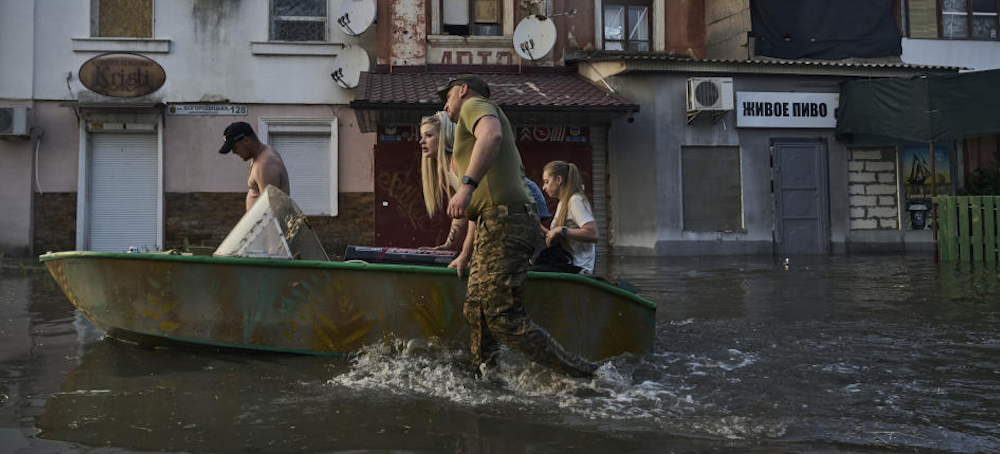Live on the homepage now!
Reader Supported News
Ten guidelines for writing about catastrophe
1. Avoid the temptation to begin the story of this manmade humanitarian and ecological catastrophe by bothsidesing it. That's not journalism.
2. Russian spokespersons claiming that Ukraine did something (in this case, blow a dam) is not part of a story of an actual event in the real world. It is part of different story: one about all the outrageous claims Russia has made about Ukraine since the first invasion, in 2014. If Russian claims about Ukrainian actions are to be mentioned, it has to be in that context.
3. Citing Russian claims next to Ukrainian claims is unfair to the Ukrainians. In this war, what Russian spokespersons have said has almost always been untrue, whereas what Ukrainian spokespersons have said has largely been reliable. The juxtaposition suggests an equality that makes it impossible for the reader to understand that important difference.
4. If a Russian spokesman (e.g. Dmitri Peskov) must be cited, it must be mentioned that this specific figure has lied about every aspect of this war since it began. This is context. Readers picking up the story in the middle need to know such background.
5. If Russian propaganda for external consumption is cited, it can help to also cite Russian propaganda for internal consumption. It is interesting that Russian propagandists have been long arguing that Ukrainian dams should be blown, and that a Russian parliamentarian takes for granted that Russia blew the dam and rejoices in the death and destruction that followed.
6. When a story begins with bothsidesing, readers are being implicitly instructed that an object in the physical world (like a dam) is really just an element of narrative. They are being guided into the wrong genre (literature) right at the moment when analysis is needed. This does their minds a disservice.
7. Dams are physical objects. Whether or how they can be destroyed is a subject for people who know what they are talking about. Although this valuable NYT story exhibits the above flaws, it has the great merit of treating dams as physical rather than narrative objects. When this exercise is performed, it seems clear that the dam could only have been destroyed by an explosion from the inside.
8. Russia was in control of the relevant part of the dam when it exploded. This is an elemental part of the context. It comes before what anyone says. When a murder is investigated, detectives think about means. Russia had the means. Ukraine did not.
9. The story doesn't start at the moment the dam explodes. Readers need to know that for the last fifteen months Russia has been killing Ukrainian civilians and destroying Ukrainian civilian infrastructure, whereas Ukraine has been trying to protect its people and the structures that keep them alive.
10. The setting also includes history. Military history offers an elemental point. Armies that are attacking do not blow dams to block their own path of advance. Armies that are retreating do blow dams to slow the advance of the other side. At the relevant moment, Ukraine was advancing, and Russia was retreating.
The pursuit of objectivity does not mean treating every event as a coin flip, a fifty-fifty chance between two different public statements. Objectivity demands thinking about all the objects -- physical objects, physical placement of people -- that must be in the story, as well as all of the settings -- contemporary and historical -- that a reader would need in order to come away from the story with greater understanding.
READ MORE Ratings for CNN have been down considerably since Chris Licht took over as chief executive. (photo: Vincent Tullo/NYT)
Ratings for CNN have been down considerably since Chris Licht took over as chief executive. (photo: Vincent Tullo/NYT)
The executive swept into the top job with ambitious plans to remake the cable news giant. But he came under scrutiny as ratings dropped and criticism of his strategic decisions reached a fever pitch.
Licht, 51, who rose through the media industry ranks as a television producer, took the reins at CNN in February 2022 after the abrupt resignation of Jeff Zucker, who stepped down because he had failed to disclose a consensual relationship with a colleague.
In a statement announcing Licht's ouster, Warner Bros. Discovery chief David Zaslav said: "I have great respect for Chris, personally and professionally."
“The job of leading CNN was never going to be easy, especially at a time of huge disruption and transformation, and he has poured his heart and soul into it. While we know we have work to do as we look to identify a new leader, we have absolute confidence in the team we have in place and will continue to fight for CNN and its world class journalism," Zaslav added.
CNN will be steered by an "interim leadership team" that includes executives Amy Entelis, Virginia Moseley and Eric Sherling, as well as David Leavy, the organization's newly installed chief operating officer, Zaslav said.
When Licht took over CNN, he sought to differentiate himself from Zucker, who had publicly clashed with former President Donald Trump. Licht, reportedly following a mandate from Zaslav, attempted to move the news brand to the political center and make it more palatable to both conservative viewers and GOP newsmakers.
He also rolled out a new morning program co-anchored by Don Lemon, who was fired in April after Variety published an article detailing allegations that he had mistreated female colleagues. Lemon, who also faced backlash for on-air comments suggesting GOP presidential contender Nikki Haley was not “in her prime” because she is in her 50s, denied the allegations.
Licht drew intense scrutiny in recent months as CNN prime-time ratings dipped and the new morning show flailed. He found himself where few news executives wish to be: the center of the story.
He was harshly criticized by pundits for hosting a live town hall event with Trump on May 10. In response, commentators faulted Licht for having given the Republican front-runner a platform to make baseless claims about 2020 voter fraud and other issues in front of a crowd of Trump loyalists. The New York Times headline: “Trump’s Falsehoods and Bluster Overtake CNN Town Hall.”
The veteran CNN anchor Christiane Amanpour publicly rebuked the network’s decision during a commencement address at Columbia University the week after the town hall aired, noting that she had “a very robust exchange of views” with Licht. Licht is said to have stood by his decision, reportedly saying in part: “America was served very well by what we did last night.”
The negative assessments reached a fever pitch on Friday after The Atlantic published a 15,000-word article titled “Inside the Meltdown at CNN.” Tim Alberta, a reporter who had shadowed Licht for months (including during a personal training session), detailed the executive’s fixation on his own press coverage and quoted him mocking CNN journalists’ coverage of the pandemic.
“Every move he made, big programming decisions and small tactical maneuvers alike, seemed to backfire. By most metrics, the network under Licht’s leadership had reached its historic nadir,” Alberta wrote.
The Atlantic article circulated widely on social media in the days that followed, and high-profile media observers — including Brian Stelter, a former CNN journalist who was fired last year — publicly speculated that Licht might not be long for the job.
Licht apologized to staff members on an internal conference call the Monday after the article ran, CNBC reported, citing people familiar with the matter. He told employees that he did not recognize the person depicted in Alberta’s article.
Licht came to CNN from CBS’ “The Late Show with Stephen Colbert,” where he served as executive producer and showrunner. He was previously known for having launched MSNBC’s “Morning Joe” and overseeing the successful revamp of “CBS This Morning” — career experiences that burnished his reputation as a wunderkind television producer.
In a profile of Licht published in The New York Times in December, Colbert recalled warning his executive producer not to take the CNN job. "CNN would be lucky to get you," the late-night comedian is quoted as saying. "But you’re my friend, and I’m telling you not to go."
Licht began his career at the KNBC station in Los Angeles, roughly around the time the O.J. Simpson murder trial dominated national attention. (KNBC is one of the 12 local media channels owned and operated by NBCUniversal, the parent company of NBC News.)
Follow us on facebook and twitter!
PO Box 2043 / Citrus Heights, CA 95611



No comments:
Post a Comment
Note: Only a member of this blog may post a comment.